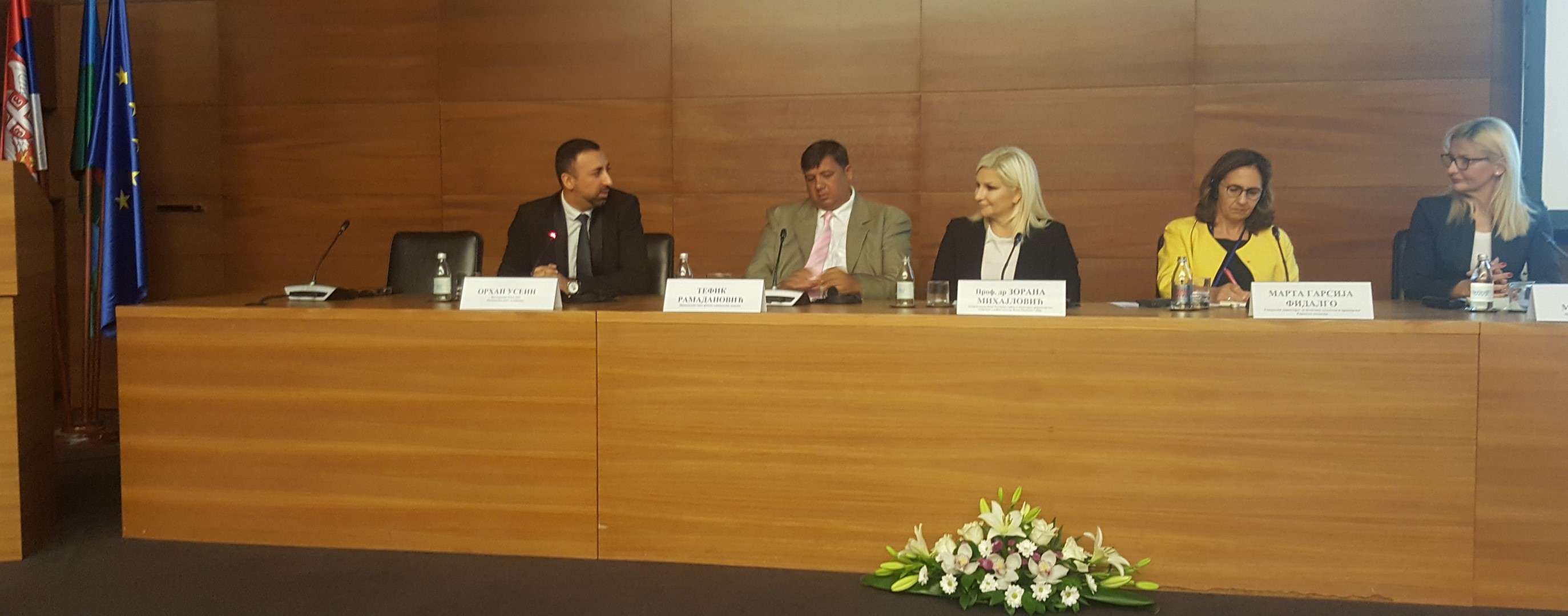Roma Integration 2020 Action Team Leader Key Note Speech at the Roma Seminar in Serbia
- 19 Oct 2017
- News

2017 Roma Seminar in Serbia (photo: RCC/Aleksandra Bojadjieva)
Regional Cooperation Council's Roma Integration 2020 Action Team Leader, Mr Orhan Usein, had a key note speech at the opening of the 2017 Roma Seminar in Serbia organized by the Government of Serbia and the European Commission. The Roma Seminars are biannual meeting between the enlargement governments and the European Commission that set the EU integration priorities for the following two years on the integration of Roma. The resulting operational conclusions represent an obligation of the enlargement Governments on their path to the European Union.
Mr Usein based his speech on the discussions held with a range of stakeholders relevant for Roma integration in Serbia, previously organized within the framework of the Roma Integration 2020 project, primarily the 2016 and 2017 National Platforms on Roma issues in Serbia. The key conclusions and recommendations from these dialogues were included in the key notes and served to kick off the discussions during the Roma Seminar.
Mr Usein thanked the Serbian Government for generously hosting the Roma Integration 2020 Action Team. He also commended the cooperation of the Serbian Government on the project and expressed hope for continuation. Compliments were also extended for the successful completion of the 2016 monitoring report, which is a very comprehensive and detailed report on the implementation of the Strategy on Roma, with hopes for further cooperation to improve the reporting process. Further on, Mr Usein congratulated the Government on the adoption of the Strategy and Action Plan, which although delayed, has the potential for the Government to catch up with the implementation process, for which the Roma Integration 2020 Action Team stands ready to provide full expert and technical support. In particular, it is expected that the Government of Serbia will adopt the monitoring standards regionally agreed within the project, as an official part of the Roma Strategy. Such alignment is a step closer to Serbia's enlargement efforts. It will provide for enhanced mandate to the State Statistical Offices and the line ministries to collect and follow the requests as per the template.
Regarding the general recommendations, concerning the institutional set up, clarifying of the institutional arrangements and roles and responsibilities of the official actors is expected. There is a need to improve the use of donor funding, including the use of IPA for the benefit of Roma. Roma Integration 2020 is actively supporting participating governments in this regard, among others, with the forthcoming regional donor coordination conference and other activities directed to improved budgeting. Participation of Roma in the implementation of policies at national and local level, including by formal engagement of Roma professionals within the public sector, is strongly encouraged. Discrimination towards Roma remains a great challenge, hence establishing strong non-discrimination mechanisms to prevent and protect Roma from discrimination in all spheres of life is yet another structural recommendation. To illustrate the challenge, 55% of the interviewed businesspersons within our Balkan Barometer survey considered that employing a Roma in their company, even when the person is fully qualified for the job, would negatively affect the business and the working atmosphere. Specific attention should be paid to systemic discrimination, especially to those provisions that seem neutral or affirmative, yet in the long run turn out to have negative effects on Roma, depraving and marginalizing them further and deeper.
Specific key point in education were also made. It was noted that the government is marking the most progress in this area, and generally should keep up the good work. Still, it may take further steps in preschool education, with supporting new facilities and removal of the criterion that both parents have to be employed for a child to attend preschool. Institutionalizing, solving the status and providing for professional development of the teaching assistants, is a matter of urgency. Reintegration programs for returnees in education are lacking or not sufficient to ensure smooth and genuine reintegration. Focus should shift from promoting enrollment of children in all levels of education towards completion of education. Developing efficient anti-discrimination measures in education, including redressing previous effects of discriminatory practices (such as the 2008 rule on enrolment that led to segregation in a number of schools) is another recommendation.
In the area of employment the conviction that mainstream employment measures target vulnerable groups including Roma and lead to their increased formal employment has proven completely ineffective. Unfortunately, the results of employment among Roma are disappointing. Therefore, a new approach is needed for employment of Roma in Serbia, which has to clearly target Roma and lead to sustainable employment, both in the public and the private sector. Some specific proposals include: regulating social entrepreneurship; engaging Roma as employment mediators and in the governing mechanisms responsible for employment; establishing and supporting a specific employment agency for Roma; and preventing discrimination in the labour market.
Health and social protection are important integration areas, and the main recommendation that is still posing difficulties for all the involved stakeholders is the institutionalization of the Roma health mediators. This has to be done at national level and the mediators must be included in the official health system. On social protection, it is strongly adviced that social centres provide for better outreach to the Roma families and individuals, particularly to children living and working on the streets, including by engaging Roma social mediators and ensuring Roma benefit from the social services they are entitled to. The law on free legal aid would somewhat compensate for this issues.
In housing the groundwork for effective measures is in place, primarily with the GIS database, the new law on housing and the programmed IPA funding. The implementation is ahead, and this is the priority. Additionally, the Government should consider combining the housing measures primarily with employment, but also other socio-economic measures for Roma.
Finally, Mr Usein highlighted that in the past year and a half since the launch of our project, regional cooperation has proven to be an extremely important method for better coherence of the socio-economic development of this region. The lesson learned is that achieving sustainable solutions for Roma integration may be achieved through enhanced regional cooperation, which has proven to be realistic. Thus, Roma Integration 2020 strives to establish regional standards that would be carefully followed by the participating governments. It should also be underlined that Serbia has an advanced budgeting system in place (the program budgeting model), which could be used as a good model to adjust the public budgeting to the needs of the Roma community. This could be done in the reform process of the budgeting methods, where adjusting the process to the needs of Roma is seen as a potential for further work, through the sector budget support. Finally, the Roma Integration 2020 Action Team stands as ready as always to continue and enhance the cooperation with the Government of Serbia, especially when it comes to support needed in: monitoring; budgeting; and implementing the commitments taken through the Strategy and the Operational Conclusions.






